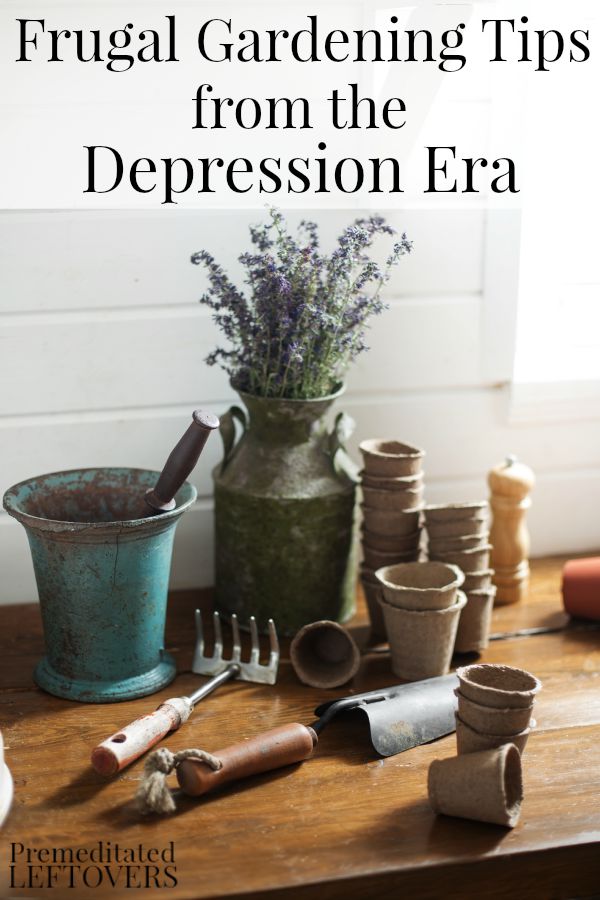Use these frugal gardening tips from the Great Depression Era to save money while growing vegetables and fruits for your family.
Now days, it is almost a hobby or a trend to have a little backyard garden. We share with our neighbors when we have a bountiful harvest, and we may grow enough to spend some time baking pies or canning in the fall, but for the majority of us, it is not necessary for our survival. During the Depression Era, this was anything but a hobby for the majority of folks that cultivated their own garden. Families worked on their gardens together because having a good harvest meant there was more to go around during the off season and cold winter months, and that meant less money they would have to spend when budgets were already so tight. These folks mastered the backyard garden. Here are some frugal Depression Era gardening tips to help you master yours!
Frugal Depression Era Garden Tips
Carefully plan out what you will be growing and the season you have to grow it in. It is vital that you grow only the produce that makes the most sense for your family’s needs and the part of the country that you are living in. Since most people didn’t have much space, it was essential they use whatever space they had wisely. Also, only grow what your family will eat. If you want to grow squash, but no one will eat it, it is wasted food and wasted space.
Don’t buy more produce from the store than you absolutely need. In other words, if you will be having beans in your garden, the month they harvest, don’t buy beans at the store out of habit. Instead, thoughtfully plan your store purchases – only buying what you need to supplement what you are harvesting.
Plan out recipes you will be using when things are ready to harvest. Plan dinners that will give recently harvested produce a starring role in main dishes such as soups and casseroles. This will limit what you have to work with, but will more closely resemble the money-saving habits of depression era gardeners. If you can’t use all of the produce that you harvest, make a plan for canning or freezing the excess produce to use later.
Use whatever free gardening supplies you can find. Re-purpose things you would normally throw away in your garden instead of buying garden tools. For instance, a milk jug can be cut to create a scoop for your soil when you are planting and an old box-spring from a bed can be used as a trellis for your peas to vine up on. The more you can get for free, the less you will have to spend. Here are some household items you can repurpose in your garden.
Plant some fall harvest vegetables that will last for a while in storage. There are lots of vegetables that are harvested in the fall, such as potatoes, turnips, and even carrots if you get them before it gets too cold. All of these root vegetables allow you to extend your gardening season, and they will stay fresh if you have a place to store them that is right around 50 degrees.
Compost from your kitchen if you can. Composting is a wonderful way to provide nutrients to your garden, and it is a free form of fertilizer. If you have never composted before, here is how to get started.
Build a cold frame to extend your gardening. A cold frame will allow you to garden many plants well into and often through the winter. This is a project you can build yourself, and if you intend on gardening as if you are completely broke, you should probably use re-purposed items as well.
More Depression Era Tips
Money Saving Tips from the Depression Era
Depression Era Tips to Stretch Your Food Budget
8 Forgotten Depression Era Tips Money Saving Tips
More Tips for Gardening on a Budget:
Frugal Ways to Build a Cold Frame
Frugal DIY Compost Bin Projects


Sally Godwin says
I’m new to this site so, forgive me if this tip has already been passed on.
Instead of buying costly air-freshener sprays for the WC, keep a box of matches in there and light one when there is a bad smell….if you know what I mean!
Waft it about to put out the flame and you will discover the odour has been replaced with the smell of the extinguished match, which soon dissipates.
Don’t ask me how it works, but it does! Try it and see 🙂
K.c. says
😄 I was born in 1962 and we had an outside ‘pit toilet and we used to keep a box of matches in the loo just for this purpose!